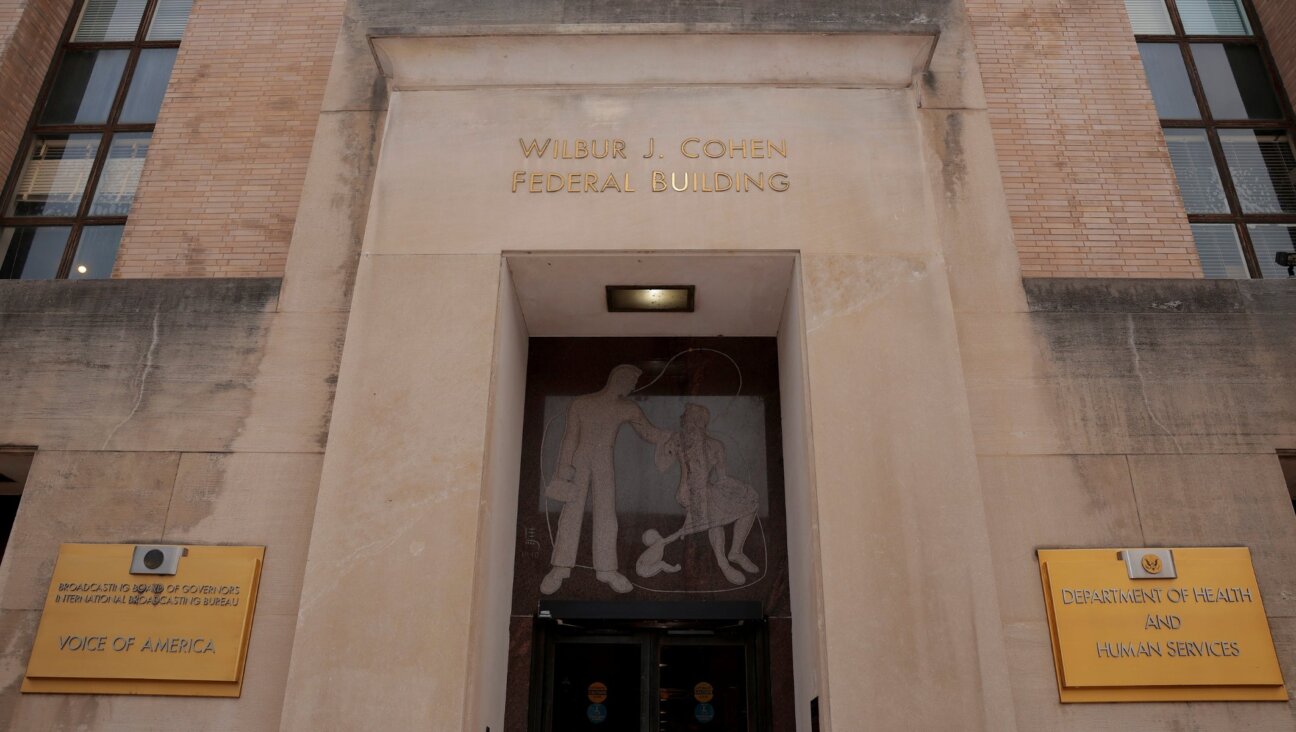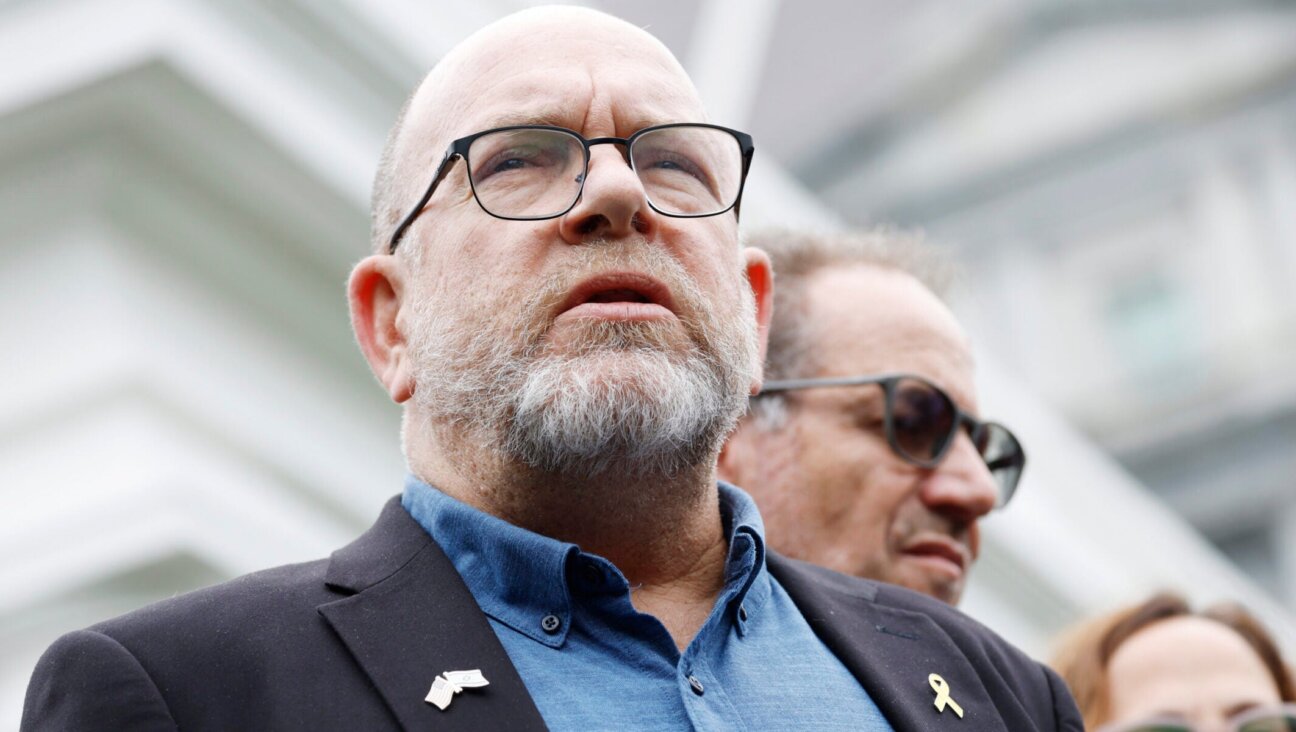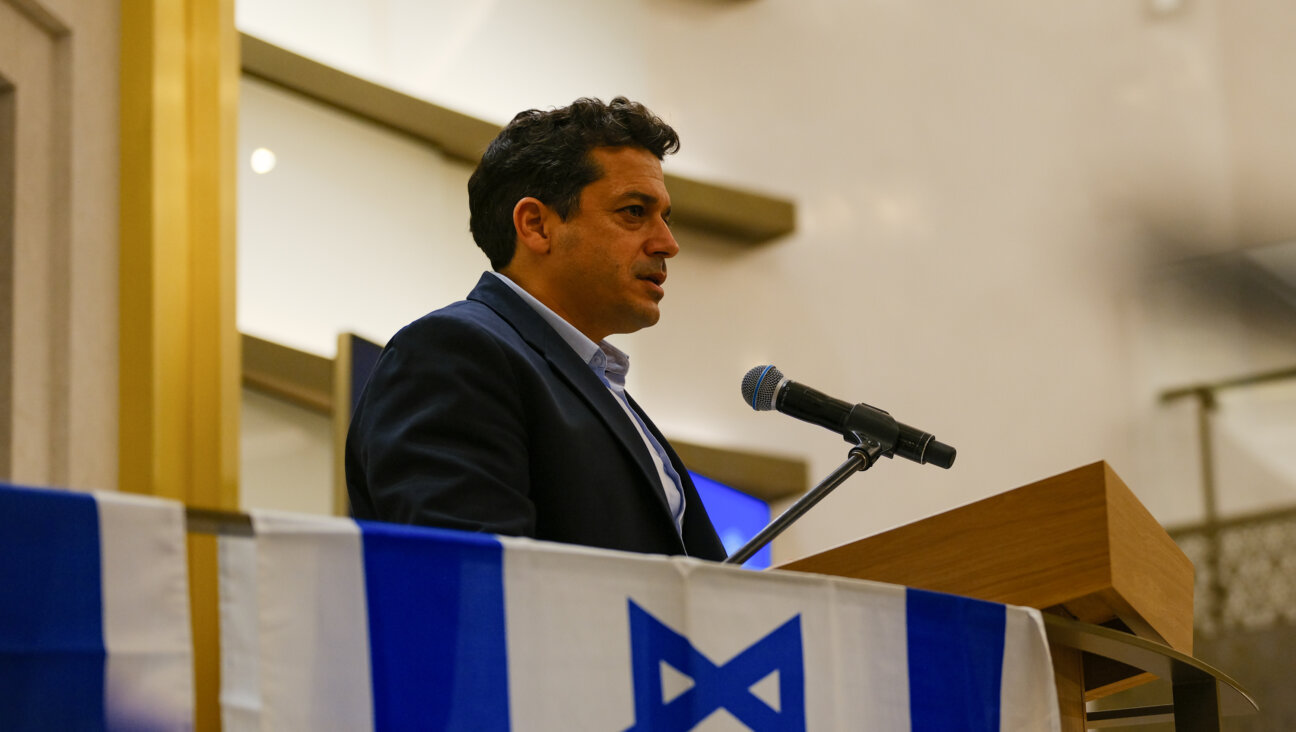Anti-Semitism Fight Hinges on Definition

Graphic by Angelie Zaslavsky

Chilling Effect? Activists attend a California hearing about proposed measures to limit so-called hate speech, which some believe may include legitimate anti-Israel protests. Image by cecilie surasky
When the California State Assembly passed a nonbinding resolution recently, urging state-funded colleges to clamp down on anti-Semitism, the storm that followed sent some of the resolution’s supporters backtracking.
The resolution’s wording, critics said, threatened to label as anti-Semitic those who strongly criticize Israel over its occupation of the West Bank and Gaza, or advocate measures to oppose its policies.
Among other things, the resolution condemned calls to boycott, divest from and sanction Israel as a “means of demonizing Israel,” and included as examples of “anti-Semitic discourse” assertions that “Israel is a racist, apartheid, or Nazi state [and] that Israel is guilty of heinous crimes against humanity, such as ethnic cleansing and genocide.”
Critics replied that such actions chill free-speech advocacy. And in response, at least one co-sponsor now says she will push a new resolution in the legislature’s next session, one that celebrates the First Amendment and promotes an environment on campuses where students can feel safe to express differing opinions.
Once again, it seemed, the problem of defining anti-Semitism when it comes to Israel had tripped up efforts to combat anti-Jewish prejudice. And in this instance, as elsewhere, an obscure agency of the European Union emerged, improbably, as an underlying nexus in the dispute.
Like many others addressing the issue, the state assembly referenced a definition of anti-Semitism first put out by the European Monitoring Centre on Racism and Xenophobia, known under the acronym EUMC, in 2005. Yet oddly, it is a definition the center’s successor agency does not use in its own publications today. One of the center’s top officials for monitoring anti-Semitism refers to the definition as “an historical document” that was meant only as a “guide for data collection” for its affiliates.
“There is no issue of the FRA, as an EU agency, endorsing any definition,” the official, Ioannis Dimitrakopoulos told the Forward, referring to the European Union Agency for Fundamental Rights, the EUMC’s successor agency, by its acronym.
Nevertheless, what the EUMC referred to originally as a “working definition” has become a standard for important institutions on both sides of the Atlantic. Besides the California State Assembly, it is cited by the U.S. State Department, the United Kingdom’s All-Party Parliamentary Group Against Antisemitism, the Organization for Security and Co-operation in Europe and a recent report by a University of California commission on campus prejudice. The definition, which was composed with input from B’nai Brith International and the American Jewish Committee, is also endorsed by American Jewish groups and used in reports by the Jewish Council for Public Affairs.
Many of these groups cite only the core definition — which simply describes anti-Semitism as “a certain perception of Jews which may be expressed as hatred toward Jews” — while ignoring the full text, which offers examples of how anti-Semitism can manifest itself. Taking “overall context” into account, the definition states, such examples may include:
• “Denying the Jewish people their right to self-determination — e.g., by claiming the existence of a State of Israel is a racist endeavor”;
• “Applying double standards” to Israel by demanding it follow behavior not demanded “of any other democratic nation”;
• Comparing Israeli policies to Nazi policies;
• Using “symbols and images associated with classical anti-Semitism” to characterize Israel or Israelis.
The California State Assembly noted these examples and went further in some respects by adding on others such as calls to boycott, divest from and sanction Israel, and criticism of Israel as an apartheid state.
Kenneth Stern, the American Jewish Committee’s specialist on anti-Semitism and extremism is also one of the working definition’s authors. In an interview with the Forward he said the document was never meant to be a vehicle to repress speech, but rather “for monitors to have a common frame of reference.”
“The definition isn’t perfect, but I think it’s very, very good and very, very useful,” he said. “It gives a framework for people to have discussions of what is and what isn’t [anti-Semitism].” It should be used, he suggested, as a point of discussion, not as a standard to suppress or criminalize speech.
But Dror Feiler, chair of European Jews for a Just Peace, a group strongly critical of Israel, said: “This is the problem: You have a so-called working definition, and then other people use it as if it is the definition. Then the question is, who gave these people the mandate to make it a worldwide definition?”
Richard Kuper, a former chair of Jews for Justice for Palestinians, noted that a problem with the working definition is that Israel becomes a de facto focal point. “Underpinning that document is a presumption that criticism of Israel is likely to be anti-Semitism,” he complained.
But B’nai Brith, which also had a role in drafting the EUMC definition, strongly stands by it. “There are other things that could be added to it, but it’s still a very useful definition,” Eric Fusfield, the organization’s international director of legislative affairs, told the Forward. “We found that it’s been very useful in explaining to public officials, educators, journalists who might not really know what the modern manifestations of anti-Semitism are…. We really feel that there needs to be wider circulation of this document.”
It was in the early 2000s that the EUMC first sought to create a working definition of anti-Semitism in response to a rising number of hate crimes in Europe. The agency sought to create something for organizations who were helping it collect data in EU member states. The definition was sent to primary data collectors — public authorities, civil society organizations and Jewish community organizations — as a suggested guide for recording anti-Semitic complaints and incidents, with the resulting information forwarded to the EUMC.
But according to FRA’s Dimitrakopoulos, the working definition was not well received by the organizations on the ground. These groups formulated their own definitions and guidelines when reporting statistics to the EUMC initially, and to the FRA today. Those data are, in turn, compiled and published yearly in the FRA’s annual reports.
In its latest overview of anti-Semitism in the EU, covering 2011 to 2012, the agency makes no mention of its working definition. Each nation reports its respective findings based on its own separate definitions of anti-Semitism.
The California State Assembly’s resolution, known as HR 35, was passed August 28. The University of California is deciding how to respond to a report by a campus committee on anti-Semitism which recommends a ban on what it deems hate speech on its campuses.
UC President Mark Yudof did not publicly support or denounce the assembly’s resolution. But several groups, including Jewish Voice for Peace, the Center for Constitutional Rights and the Council on American-Islamic Relations, publicly criticized the measure.
Assemblywoman Linda Halderman, one of the measure’s co-sponsors, said in a statement: “I encourage critics of HR 35 to read the legislation. It specifically recognizes the First Amendment…. The bill has nothing to do with limiting objectionable political free speech.”
But apparently, not every assembly member read the resolution before voting on it.
Assemblyman Bill Monning told the Santa Cruz Sentinel that he and other Democratic legislators believed that the resolution addressed “only real anti-Semitic activities, such as painting swastikas outside Hillel offices.” Monning said he did not know that it included references “to legitimate criticism of Israeli government policies.” Assemblyman Jim Beall, who supported HR 35, said he had read the entire resolution. He said that with the rising cases of anti-Semitic actions among students, “we’re trying to make a statement saying that’s not appropriate. We’re not telling people they can’t have their freedom of speech.”
Meanwhile, Bonnie Lowenthal, the resolution’s other co-sponsor, told The Associated Press that she would introduce another resolution with new wording in the assembly’s next session, to make clear “in no uncertain terms that students in our universities should feel safe to have differing opinions.”
Feiler, who lives in Sweden, offered some advice: “The most important thing is, we know anti-Semitism exists. We know that it causes problems for the Jews. It should be part of the struggle against all kinds of racism, including Islamophobia. Labeling too many things that are not clear as anti-Semitism endangers the working definition by trivialization.”
Contact Seth Berkman at [email protected]
















